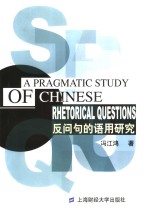
- 作 者:冯江鸿著
- 出 版 社:上海:上海财经大学出版社
- 出版年份:2004
- ISBN:7810981986
- 标注页数:250 页
- PDF页数:265 页
请阅读订购服务说明与试读!
订购服务说明
1、本站所有的书默认都是PDF格式,该格式图书只能阅读和打印,不能再次编辑。
2、除分上下册或者多册的情况下,一般PDF页数一定要大于标注页数才建议下单购买。【本资源265 ≥250页】
图书下载及付费说明
1、所有的电子图书为PDF格式,支持电脑、手机、平板等各类电子设备阅读;可以任意拷贝文件到不同的阅读设备里进行阅读。
2、电子图书在提交订单后一般半小时内处理完成,最晚48小时内处理完成。(非工作日购买会延迟)
3、所有的电子图书都是原书直接扫描方式制作而成。
前言 1
Abstract 1
Chapter 1 Introduction 1
1.0 Introduction 1
序 1
1.1 The rationale of the present study 3
1.2 Problems with the existing studies 5
1.3 Objectives of the present study 6
1.4 Methodology 7
1.5 Outline of the study 8
2.1 Studies on Chinese rhetorical questions 10
2.1.1 Rhetorical approaches 10
Chapter 2 Review of Relevant Literature 10
2.0 Introduction 10
2.1.2 Grammatical approaches 12
2.1.3 Pragmatic approaches 16
2.2 Overseas studies of rhetorical questions 33
2.2.1 Rhetorical approaches 33
2.2.2 Linguistic approaches 34
2.2.3 Pragmatic approaches 39
2.3 Summary 44
3.1 Methodology in the present study 46
Chapter 3 Research Methodology 46
3.0 Introduction 46
3.2 Description of the data 48
3.3 Summary 49
Chapter 4 Identification and Interpretation of Chinese Rhetorical Questions 51
4.0 Introduction 51
4.1 Theoretical background of the present approach 51
4.2 The identification of Chinese rhetorical questions 64
4.2.1 Previous definitions of Chinese rhetorical questions 65
4.2.2 Distinctive features of Chinese rhetorical questions 69
4.2.2.1 The discrepancy between the form and the Communicative function of rhetorical ques-tions 70
4.2.2.2 The polarity shift between the rhetorical ques-tion and its implied answer 78
4.2.2.3 The multiplicity in the communicative function of rhetorical questions 80
4.2.2.4 The indirectness and implicitness of rhetoricalquestions in conveying ideas 83
4.3 The interpretation of Chinese rhetorical questions 90
4.4 Summary 94
Chapter 5 Responses to Chinese Rhetorical Questions 97
5.0 Introduction 97
5.1 An overview of the previous approaches to answerhood 98
5.1.1 Kiefer's pragmatic approach to the study of answers 99
5.1.2 Grewendorf's practical application of the probability and decision theories to the study of answers 102
5.1.3 Stenstr?m's conversation-and discourse-analytical approach to the study of answers 103
5.1.4 Ilie's pragmatic study of the adequacy of answer-hood 105
5.1.5 A classification of responses to questions 109
5.2 Responses to rhetorical questions 111
5.2.1 An overview of response types 112
5.2.2 Types of responses to rhetorical questions 116
5.2.2.1 Implicit vs.explicit answers to rhetorical ques-tions 118
5.2.2.2 Explicit answers vs.replies to rhetorical ques-tions 122
5.2.3 Types of explicit answers to rhetorical questions 124
5.2.3.1 Addresser's answers to rhetorical questions 125
5.2.3.2 Addressee's answers to rhetorical questions 129
5.2.4 Types of replies to rhetorical questions 135
5.2.4.1 Addresser's replies to rhetorical questions 136
5.2.4.2 Addressee's replies to rhetorical questions 145
5.2.4.2.1 Acknowledging vs.non-acknowledging ad-dressee's replies 146
5.2.4.2.2 Addressee's replies conveying agreement vs.disagreement 148
5.2.5 Non-verbalized responses to rhetorical questions used as assertives 155
5.2.6 Responses to rhetorical questions used as directives 157
5.3 Redefining rhetorical questions 161
5.4 Summary 163
Chapter 6 Rhetorical Questions as Discursive and Argumentative Acts in Talk Shows 167
6.0 Introduction 167
6.1 About talk shows 168
6.1.1 Talk shows as a semi-institutional discourse 169
6.1.2 The question-response sequence in talk shows 171
6.2 Discursive characteristics of rhetorical questions in talk shows 177
6.3 The pragma-dialectical approach to argumentation 202
6.4 Argumentative use of rhetorical questions in talk shows 208
6.4.1 Argumentative patterns of rhetorical questions intalk shows 208
6.4.2 Rhetorical questions that function as standpoints 214
6.4.3 Rhetorical questions that function as arguments 217
6.5 Summary 219
7.0 Introduction 222
Chapter 7 Conclusion 222
7.1 Summary of the findings 223
7.1.1 Major findings in the identification of chinese rhe-torical questions 223
7.1.2 Major findings in the responses to Chinese rhetorical questions 224
7.1.3 Major findings in the investigation of Chinese rhe-torical questions as di scursive and argumentative acts in talk shows 228
7.2 Theoretical and practical implications 229
7.3 Limitations of this study 231
7.4 Suggestions for future research 232
Appendix 1 Sources of rhetorical questions in the corpus 233
Appendix 2 Secimen analyses of rhetorical questions in corpus 235
Bibliography 239
